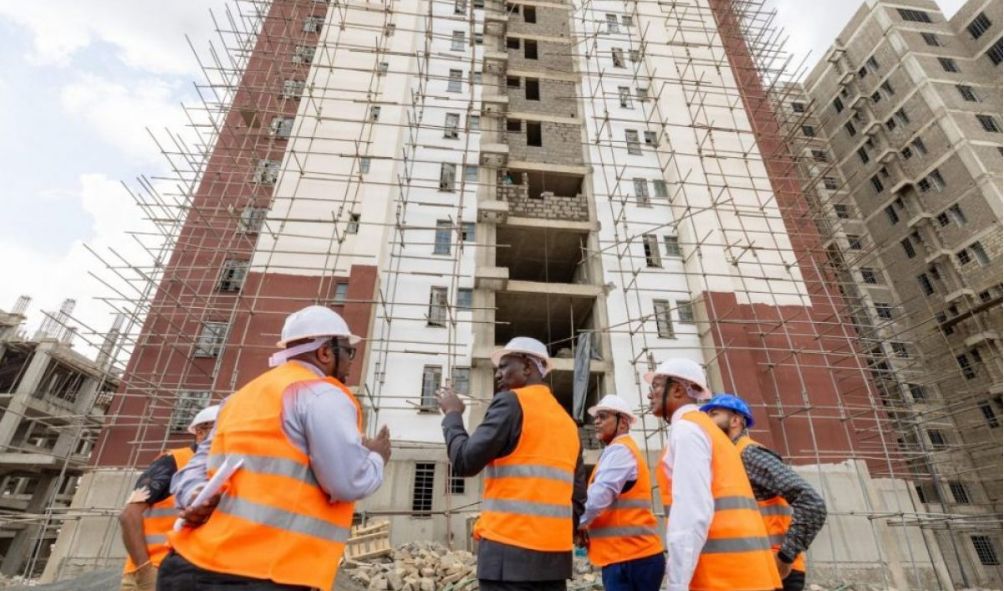Investigations
How Somali Cartels Manipulate Nairobi County Officials to Build on Riparian Land

In recent years, the skyline of Eastleigh, a bustling neighborhood in Nairobi, has been dramatically transformed by high-rise buildings that seem to defy both gravity and the law.
These developments are often attributed to powerful Somali cartels who have gained significant influence in Nairobi, enabling them to bypass regulations and bribe county officials to build on riparian land.
This situation has become so dire that even directives from President William Ruto have failed to curb illegal construction practices, highlighting a troubling trend of corruption and lawlessness.
The Rise of Somali Cartels in Nairobi
Somali cartels in Nairobi have become synonymous with unchecked power and influence.
They have strategically infiltrated key positions within the county government, leveraging tribal affiliations to secure protection and favorable treatment.
This network of influence allows them to circumvent legal restrictions, particularly those concerning building regulations on riparian land, which is intended to protect waterways and prevent environmental degradation.
Bribery and Corruption: The Open Secret
Bribery has become the modus operandi for these cartels. Nairobi County officials, incentivized by substantial bribes, turn a blind eye to illegal construction.
For instance, reports have emerged of officials accepting Ksh 2 million from the owners of Jannah Villas in Eastleigh’s Section 3 (Bahati Riverbank) to avoid demolishing the property, even though it stands on riparian land.
This blatant disregard for the law underscores the depth of corruption permeating the system.
Defiance of Presidential Directives
Confusion and resistance have met President William Ruto’s attempts to impose regulations on high-rise buildings in Eastleigh.
In May, Ruto announced lifting restrictions on building heights, allowing construction up to 25 or 30 storeys to accommodate the growing population.
However, during the Kenya Air Force 60th celebrations, he appeared to reverse this stance, advocating for adherence to existing height regulations to protect the airbase’s premium status.
This flip-flopping has only added to the chaos, enabling Somali cartels to exploit the situation. Developers in Eastleigh, through the Property Developers Welfare Society of Nairobi, have expressed their frustration with the conflicting directives.
They argue that such inconsistencies open the door for rogue officials to exploit them further, demanding bribes for approvals and leniency.
The Impact on Urban Planning and Safety
The unchecked construction of high-rise buildings on riparian land poses significant risks to urban planning and safety.
Riparian zones are crucial for maintaining ecological balance, preventing floods, and ensuring water quality.
Building on these lands not only compromises the environment but also puts residents at risk of structural failures and flooding, as these areas are not suitable for heavy construction.
The Somali cartels’ ability to manipulate regulations and secure unauthorized approvals disrupts the integrity of urban planning in Nairobi.
Calls for Transparency and Accountability
The Property Developers Welfare Society of Nairobi has called for a meeting with stakeholders to address the confusion and ensure transparent communication and regulation.
Abdi Dahir, the Society’s Secretary General, emphasized the need for clarity in regulations and a conducive environment for sustainable growth.
The society advocates for adherence to approved plans and supports the crackdown on rogue developers.
However, the society’s chairperson, Abdirahman Mohamed, criticized the county government for causing uncertainty and affecting investments by issuing approvals that they later disowned.
He urged developers to follow the law but highlighted the need for consistent and reliable directives from authorities.
The Need for Legal and Institutional Reforms
To combat the influence of Somali cartels and restore order in urban planning, there is a pressing need for comprehensive legal and institutional reforms. This includes:
- Strengthening Anti-Corruption Measures: Enhancing the capacity of anti-corruption bodies to investigate and prosecute bribery cases involving county officials and developers.
- Clear and Consistent Regulations: Establishing clear, consistent, and enforceable building regulations that leave no room for misinterpretation or exploitation.
- Independent Oversight: Creating an independent oversight body to monitor urban development projects and ensure compliance with environmental and safety standards.
- Public Awareness and Involvement: Educating the public on the importance of adhering to building regulations and involving communities in urban planning decisions to foster accountability.
Conclusion
The growing influence of Somali cartels in Nairobi’s urban development scene is a troubling phenomenon that undermines the rule of law and endangers public safety.
For President William Ruto’s directives to be effective, they must be clear, consistent, and backed by robust enforcement mechanisms.
Ultimately, restoring integrity in Nairobi’s urban planning will require a concerted effort from all stakeholders, including government officials, developers, and the public.
Kenya Insights allows guest blogging, if you want to be published on Kenya’s most authoritative and accurate blog, have an expose, news TIPS, story angles, human interest stories, drop us an email on [email protected] or via Telegram
-

 Grapevine2 weeks ago
Grapevine2 weeks agoRussian Man’s Secret Sex Recordings Ignite Fury as Questions Mount Over Consent and Easy Pick-Ups in Nairobi
-

 News1 week ago
News1 week agoTHE FIRM IN THE DOCK: How Kaplan and Stratton Became the Most Scrutinised Law Firm in Kenya
-

 Investigations1 week ago
Investigations1 week agoMulti-Million Dollar Fraud: Three Kenyans Face US Extradition in Massive Cybercrime Conspiracy
-

 Economy1 week ago
Economy1 week agoIran Demands Arrest, Prosecution Of Kenya’s Cup of Joe Director Director Over Sh2.6 Billion Tea Fraud
-

 Business1 week ago
Business1 week agoA Farm in Kenya’s Rift Valley Ignites a National Reckoning With Israeli Investment
-

 Africa2 weeks ago
Africa2 weeks agoFBI Investigates Congresswoman Ilhan Omar’s Husband’s Sh3.8 Billion Businesses in Kenya, Somalia and Dubai
-

 Grapevine3 days ago
Grapevine3 days agoA UN Director Based in Nairobi Was Deep in an Intimate Friendship With Epstein — He Even Sent Her a Sex Toy
-

 Politics2 weeks ago
Politics2 weeks agoSifuna, Babu Owino Are Uhuru’s Project, Orengo Is Opportunist, Inconsequential in Kenyan Politics, Miguna Says

















